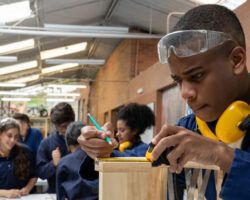Are you thinking about becoming a lecturer in the Further Education (FE) or the Higher Education sectors (HE)? In the below article, we shall explore some key differences and similarities of the two roles. HE Lecturer Working as an HE lecturer can be an incredibly rewarding job. You can talk…>
Working in FE
The impact of Further Education (FE) phone policies
Phone bans in classrooms and schools are becoming increasingly popular. A recent study has found that banning phones in the classroom has not had the desired effect. Students in college are in that fine line between school and adulthood, with the desire to be treated as adults, which is the…>
What are the benefits of working in Further Education?
Why work in Further Education? To quote the Association of Colleges, “Colleges are brilliant”. Serving 1.6 million people, England’s 218 colleges represent the most diverse subsector of our wider education system. From specialist land-based and creative colleges, to sixth form colleges and general Further Education, colleges provide for learners ranging…>
Further Education and your local community
Working in Further Education (FE) can have a direct positive impact on the local community. The sector helps tackle skill shortages such as digital, health, education, engineering and science, and it improves the future of young people. In the following article, we shall explore how FE makes a positive difference…>
What is Further Education (FE)
Overview The UK education system has 4 stages Primary Education Secondary Education Further Education (FE) Higher Education (HE) Further Education refers to post-16 courses and qualifications that are not a degree. In England, it is compulsory to be in education, including apprenticeships, until 18. FE consists of different types of…>
What are support roles in Further Education?
Support Roles in Further Education Support roles in Further Education encompass a wide range of non-teaching jobs. They are the roles that support the teaching staff and students in their academic and social endeavours by providing administrative and maintenance services. Support staff are a vital part of Further Education institutions,…>
Starting to teach a practical subject
Discover the main attractions for teaching a practical subject in FE jobs.ac.uk have put together this article to help guide you on where to start when teaching a practical subject in further education. Main attractions: One of the main attractions for learners when choosing to study a vocational course at…>
The Role of the Practitioner-Lecturer within Arts and Media
Capacity Building in Higher Education Arts and Media (CBHE) CBHE continues to attract part-time lecturers from a wide range of creative, professional and academic fields. As practitioners, their contribution helps to legitimise the teaching of their specialist subjects from a professional perspective and also helps support the ongoing move to improve…>
A Practical Guide to Apprenticeships
Do you want to get started with an apprenticeship? Read this practical guide on apprenticeships by jobs.ac.uk to help you get started. Apprenticeships make up a considerable part of the Further Education sector and this is set to increase, in the academic year 2022/23 over 337,100 students started an apprenticeship…>
Working as an Unqualified Teacher in FE
Teacher Training on the Job to become a FE Teacher Don’t give up if you want to teach in Further Education (FE) but have no formal teaching qualifications. FE is one of the few education sectors where you can gain qualifications after getting your first teaching job. In 2013, the…>










